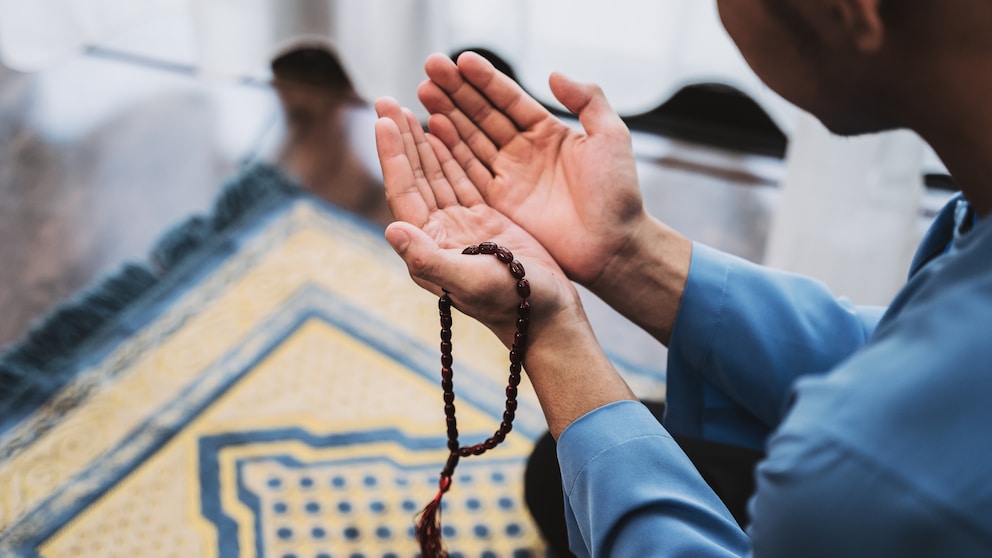March 6, 2025, 2:07 pm | Read time: 4 minutes
The fasting month of Ramadan has begun and runs until March 30. Until then, devout Muslims abstain from eating and drinking during the day and are only allowed to do so again in the evening. Are they harming their health? FITBOOK author Laura Pomer asked a nutrition expert.
During Ramadan, devout Muslims are not allowed to eat or drink anything between dawn and sunset. They only break their fast in the evening — at Iftār, the communal evening meal. Pregnant women, children, and the sick are exempt from this commandment, which sounds like quite a strain on the body. Otherwise, all Muslims from the age of religious maturity of around 14 must adhere to the rules of Ramadan. But what effect does fasting during Ramadan have on health? Is it healthy — or rather unhealthy? FITBOOK spoke to nutrition expert Uwe Knop.
Overview
What Is Ramadan?
Ramadan is the ninth month of the Islamic calendar and also the month of fasting in Islam. During this time, Muslims abstain from food, drink, and other indulgences every day from dawn until sunset. Additionally, one should refrain from “immoral acts” to foster spiritual purity and contemplation.
Fasting during Ramadan is reminiscent of the time when, according to tradition, the Koran was revealed to the Prophet Mohammed. This is why the month of fasting is considered a time of inner reflection, social commitment, and personal purification — but also a month of good deeds.1
Is Fasting During Ramadan Healthy? What a Nutrition Expert Says
Nutrition expert Uwe Knop believes that how well an adult copes with not eating or drinking depends on their individual lifestyle and physical condition. “Some people are not bothered at all by going without food for hours on end,” he notes, “while others may experience irritability and tiredness.” The nutrition expert also mentions that hypoglycemia and subsequent bouts of intense hunger are possible.
Not being allowed to quench your thirst is generally the most critical factor. This may not be so difficult on cold days — but especially when it starts to get warm and sunny, and we spend more time outdoors and get more exercise, the feeling of thirst can quickly increase. “If you also work up a sweat through physical activity, a lack of fluids is possible,” warns the nutritionist. At worst, this dehydration can lead to circulatory collapse. In any case, you have to listen to your body. If fasting during the day causes discomfort, it may not be suitable for the individual.
Everyone Who Wants to Observe the Month of Fasting Should Ask Themselves This Question
The central question is: Are you healthy enough to go through the fast? If you have the feeling that it is severely affecting your physical condition, you should reconsider the plan.
Caution Advised for Adolescents
“As adolescents are in the growth phase and their nutritional requirements are acutely higher, the potential negative effects can be even greater for them,” explains nutritionist Knop. Therefore, parents should be particularly attuned to symptoms like lack of concentration, dizziness, headaches, and fatigue, and they should assess their children’s maturity and resilience beforehand. In particular, dehydration can pose a significant risk for adolescents, who typically have a higher level of physical activity and, thus, a greater need for hydration than adults.

Expert Weighs In An Overlooked Fish Species That Is Extremely Healthy

Study Prolonged screen time can impact children’s diet

Long-distance runner highlights It’s better to run outside, even in winter – Jan Fitschen
Fasting Recommendations for Berlin Schoolchildren
The Muslim month of fasting repeatedly causes tensions in German schools. To deal with this, the district office of Berlin-Neukölln, for example, together with representatives of mosques and associations, has issued the official Neukölln recommendation “Ramadan and school.”2 It contains twelve tips. Among other things, it states: “Fasting is not a free pass to avoid school obligations. Fasting does not mean refusing to take part in sports lessons.”

